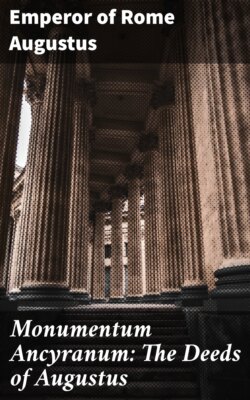Читать книгу Monumentum Ancyranum: The Deeds of Augustus - Emperor of Rome Augustus - Страница 6
На сайте Литреса книга снята с продажи.
II. Character and Purpose of the Inscription.
ОглавлениеTable of Contents
German scholars have waged a fierce warfare over the question of the literary character of the Res Gestæ, as Mommsen commonly calls it. He himself refrains from assigning it decidedly to any class of composition. Is it epitaph, or a “statement of account,” or “political statement”? Otto Hirschfeld contends strongly it is not an epitaph because it contains no dates of birth or death, and is in the first person. Wölfflin calls it a statement of account. Geppert sides with Hirschfeld. Bormann, Schmidt and Nissen all hold it to be an epitaph. And this appears to be the final agreement. The latest word is the discussion by Bormann, in 1895, in which he still maintains the epitaph view. For these discussions, cf. the bibliography at the end of this volume.
Of course it is an epitaph of unique character. It has certain striking peculiarities, and specially of omission. There is no mention of domestic affairs. The wife of the Emperor is unnamed. Although in enumerating his honors and offices it was necessary to date events by the names of consuls, yet aside from this he mentions no person outside the imperial household, not even such favorites as Mæcenas and Agrippa. His foes, Brutus, Cassius and Antony, are several times alluded to, but never named. The same is true of Lepidus and Sextus Pompeius. Unfortunate events are not noticed. His omission of the disaster to the Roman arms under Varus has been severely criticised as an attempt to deceive; but if the inscription is really an epitaph one cannot wonder at such silence. The omission of the dates of birth and death has been variously explained. Some have thought that he meant his heirs to fill in any such gaps after his death, and to recast the whole into the third person. Or, it has been suggested that it was the desire of Augustus to be counted a divinity, and that therefore he wished to pose as one “without beginning of years, or end of days.” It certainly would be incongruous to record the death of a god. With regard to his general purpose Mommsen says: “No one would look for the arcana of empire in such a document, but for such things as an imperator of mind shrewd rather than lofty, and who skillfully bore the character of a great man while he himself was not great, wished the whole people, and especially the rabble, to believe about him.” Two purposes are manifest throughout the document. One is to pose as a saviour of the state from its foes, and not at all as a seeker after personal aggrandizement; another is to represent his whole authority as having been exercised under constitutional forms. These two ideas appear again and again.
